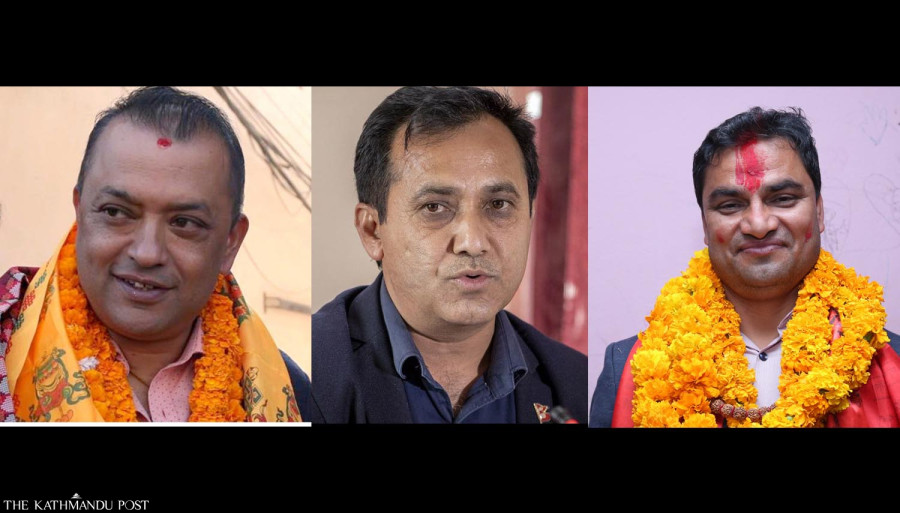Politics
Is new troika in the making in Congress?
Many find the prospect of Gagan Thapa, Bishwa Prakash Sharma and Pradip Paudel joining hands fascinating.
Anil Giri
The Nepali Congress, the grand old party of Nepali politics, has a long history of a troika in the top party leadership exercising influence in the party’s decision-making.
After the restoration of democracy in 1990, the Congress saw the first batch of its troika in Ganeshman Singh, Krishna Prasad Bhattarai and Girija Prasad Koirala who called all the shots in the party.
The centrality of Koirala, Singh and Bhattarai continued for some time but another troika was emerging inside the party that was mostly loyal to Koirala, who was leading the government, according to Congress leaders. As a result, the triumvirate of Koirala, Bhattarai and Singh did not last. Singh distanced himself from the party and Bhattarai gradually developed a soft corner for the Sher Bahadur Deuba camp, which would later split the party.
Koirala, who became prime minister following the general election in 1991, helped in giving birth to another troika of second-generation leaders in the party. This younger troika was known with the initials KGB—Khum Bhahadur Khadka, Govinda Raj Joshi and Bijaya Kumar Gachhadar. Later, Arjun Narsingh KC joined the group and it became “AKGB.”
With the rise of three young and popular youth leaders—Gagan Thapa, Bishwa Prakash Sharma and Pradip Paudel—from the party’s general convention last year who have been elected to parliament in Sunday’s elections, people have started debating whether the three will serve as agents of change in the Nepali Congress and national politics.
Thapa and Sharma are general secretaries of the party while Paudel was defeated in the same post in the general convention held last December. Thapa, Paudel and Sharma won Sunday’s parliamentary elections from Kathmandu-4, Kathmandu-5 and Jhapa-1, respectively, with wide margins over their opponents.
Once upon a time, the KGB held sway over the party and its decision-making, recalls former minister Laxman Prasad Ghimire.
“But I am not sure whether the new trio of Thapa, Sharma and Paudel will have a similar influence in the party,” Ghimire said. “It would be an exaggeration to say Thapa, Sharma and Paudel will become another troika inside the party.”
Ghimire added he is still not convinced by Thapa’s intent to bid for prime minister. “He [Thapa] should first look into the composition of lawmakers elected by the party before making such a bid. It is too early to say that Thapa, Sharma and Paudel will bring change in the party or the government.”
While Thapa has already announced that he would contest for prime minister, Sharma has promised to back the bid.
Some political observers say the idea of troika itself is fascinating, but it may not materialise, because their interests are different, and ask, “Who will play the intermediary between them to form such a group?”
“I don’t think a troika is in the making in the Congress anytime soon,” said Hari Sharma, a political analyst. “It is only possible if their interests match.”
The earlier troika became possible because they came through a long struggle and shared common interests that brought them together, Sharma added.
“But the interests and ambitions of Thapa, Sharma and Paudel could be different, and I sense they are competitors who want to outdo each other.”
Sharma further said that in politics, personal interest and ambition play a vital role, and the individual political capitals of the three youth leaders are not equal. “So the idea of a troika seems fascinating, but a difficult task,” Sharma said.
Earlier, all three, Khadka, Joshi and Gachchhadar, were from the Koirala camp and they were considered “members of Koirala’s kitchen cabinet”. But the same does not apply to Thapa, Sharma and Paudel. Thapa is an influential leader of the camp led by Shekhar Koirala while Sharma contested the election of the party general secretary from Prakash Man Singh camp who supported the prime minister and party president, Sher Bahadur Deuba, in the party’s general convention after he was ousted in the first round. Paudel is considered close to another senior leader Krishna Prasad Situala, but he contested for general secretary with the backing of the Deuba camp.
A Congress leader, meanwhile, said the idea of an alliance between Thapa, Sharma and Paudel is not bad since all three are young and popular, but Paudel is not as influential as Thapa and Sharma.
“And a big question is, will Deuba allow such a grouping?” the leader said. “Several interest groups inside the party will try to foil such attempts because they would see such a troika as a serious threat to their own leadership ambitions.”
Govind Raj Pokharel, a Congress leader and former vice-president of the National Planning Commission, said a troika of Thapa, Sharma and Paudel is a good idea but the three themselves should first sit and take the initiative.
Thapa, Sharma and Paudel did not respond to the Post’s calls for comment.




 18.12°C Kathmandu
18.12°C Kathmandu















